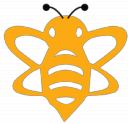Honey Bee Haven
The Black Bee Experience

Honey Bee Haven
The Black Bee Experience
Our work for Honeybees
Saving Honey Bees will not be done by Beekeepers, by politicians or even by large industry. The font line in the battle to save the Honey Bee is in all our gardens, in our public spaces, window boxes and containers.
The war to save the Honey Bee will be won by the many – not the few. We all have our bit to play.
Our work is to help people plant Honey Bee Friendly gardens, to sow wild flowers in public land to create containers and window boxes that ensure our Honey Bees don’t starve to death.
Education
Our main focus is on education – not just children and young adults, but the grown ups as well. To get them familiar with Honey Bees, realise their importance and what they can do to help.
Let’s face facts – if we don’t get the next generation involved and aware of their importance, it really doesn’t matter if we save the Honey Bee now or not – in 30 years time the people in charge won’t feel they’re important, and we will have lost the war.
The Honey Bee Heritage Centre
The hub of the Honey Bee Haven, the Heritage Centre is our educational unit, where we run school visits, workshops and seminars to help people get a little bit excited about Honey Bees, what they do for us and how they can help save them.
The centre itself is there for the benefits of all ages, but many of the workshops we run are for children as we feel the next generation needs to be fully engaged with Honey Bees is we are to come up with a long term solution to their plight.
Our Bees
From the very start our focus has been on working with the native British Black Bee.
Why the native British Bee you might ask?
The British Black Bee has spent the last 1 Million years getting used to our climate (unlike Italian Honey Bees who have been hanging around the Mediterranean getting all golden for that time). This means they can fly in rain and snow. They have strong wing muscles so are able to fly twice as far as an Italian Honey Bee.
What does this mean then? Well let’s not forget what the Honey Bees primary role is – a pollinator . Because of their strong wing muscles, Black Bees can pollinate more flowers and plants then other types of Honey Bees. This means more food for all pollinators.
This can only be a good thing, just because they aren’t as colourful as certain other Honey Bees isn’t important.
New Beekeeper Mentoring
When you first start off in beekeeper – there’s no 2 ways about it – it’s intimidating. All of a sudden you have a lot of bees (normally 50,000) to look after and it can feel like you’re really on your own.
Our belief is this is why so many new beekeepers quit within a few months.
In order to solve this predicament, we offer a mentoring system. New beekeepers can keep their hive in our apiary (after a quarantine period), this means there are beekeepers available at difficult times ready to offer advice. If you do find that life gets in the way of inspecting hives, then we can inspect them on your behalf to make sure everything is going OK.
Honeybee testing
For a beekeeper, it can be very satisfying to know which strands are in your hives. We offer a free morpohmetry testing service for anyone interested in having their bees tested. This is particularly useful for bee breeders who will need to know the purity of their strains for breeding purposes – and if you are interested in keeping Black Bees, morphometry will become a very important service to ensure you focus on the right bees.
The Gardens
We have a created a garden that is specifically Honey Bee friendly, not just Bee friendly. The plants give good examples of what is possible in any area, and on any budget. In fact with container planting and seed bombing you don’t even need a garden for these!
There is also a Heritage Orchard which contains some fine examples of old Lancashire apple trees, in coming years children can see where apples come from and even pick one to eat!
©Honey Bee Haven Limited 2015